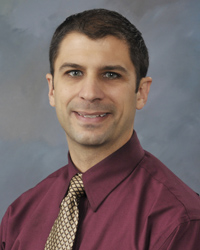
Sudden cardiac arrest is when the heart suddenly stops working and becomes unable to function properly. It occurs in more than 350,000 individuals in the United States yearly. While heart related deaths occur much less frequently in young people, it is especially devastating to families, schools and the extended community when young, apparently healthy people die unexpectedly. February is Heart Month, a good time to review signs and symptoms that can be associated with an increased risk of sudden cardiac death.
Signs and Symptoms
James Galas, MD, a pediatric cardiologist on staff at DMC Children’s Hospital of Michigan with an interest in providing public awareness programs to the community, says sudden cardiac arrest may come without warning. “Studies suggest that in the majority of cases of sudden cardiac death, the athlete does not recognize symptoms until the actual cardiac arrest,” he says. Therefore it is important to be aware of signs and symptoms that have occurred in the young person and to be aware of any family members with serious heart disease.
Talk to a medical professional if you or someone you know has any of the following signs or symptoms:
• Symptoms with exercise including sudden, unexplained fainting, unexplained seizures, and shortness of breath, not explained by a more common health issue such as asthma
• Racing or fluttering heartbeats
• Family history of sudden heart related death before the age of 50
Some causes of sudden cardiac arrest include:
• Hypertrophic cardiomyopathy (HCM) , an abnormally thick heart muscle
• Coronary artery abnormalities
• Long QT syndrome (LQTS), an inherited heart rhythm disorder that can cause the heart to beat fast, irregular, and inefficiently
• Previously unrecognized heart defects
• Heart muscle abnormalities
• Inflammation of the heart from another illness
• Cardiac arrhythmias, a malfunction of the heart’s electrical system
• Commotio Cordis, a blow to the heart which causes an arrhythmia
When a person goes into sudden cardiac arrest, seconds and minutes can mean the difference between life and death. When someone is unresponsive and not breathing, call 911 and take action to help the victim. Learning CPR (cardiopulmonary resuscitation) and how to use an AED (Automated External Defibrillator) can save a life. Courses are offered regularly through the American Red Cross. If you or someone you know has experienced any of the signs or symptoms mentioned above, please contact your primary care physician.
 DMC Children’s Hospital of Michigan offers pediatric cardiology services at their specialty centers in Birmingham, Clinton Township, and Detroit. For further information on pediatric cardiology services visit www.childrensdmc.org/pediatric-heartcenter or to schedule an appointment with a physician at DMC Children’s Hospital of Michigan, call (313) 745-KIDS or toll-free at (888) 362-2500.
DMC Children’s Hospital of Michigan offers pediatric cardiology services at their specialty centers in Birmingham, Clinton Township, and Detroit. For further information on pediatric cardiology services visit www.childrensdmc.org/pediatric-heartcenter or to schedule an appointment with a physician at DMC Children’s Hospital of Michigan, call (313) 745-KIDS or toll-free at (888) 362-2500.
